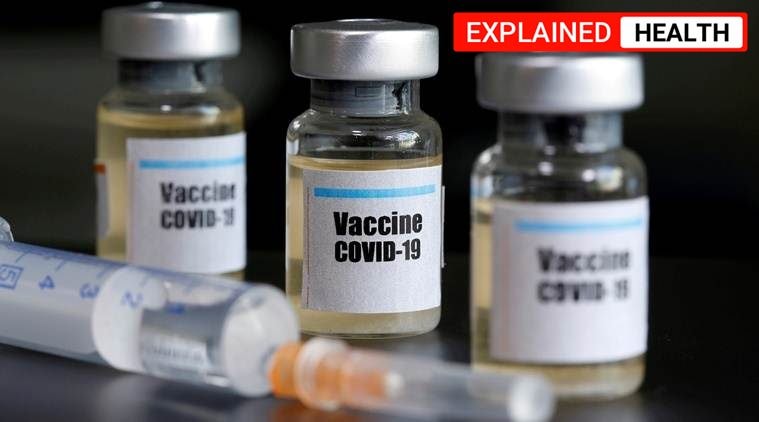
[ad_1]
, Edited by Explained Desk | New Delhi |
Updated: July 2, 2020 11:18:28 am
 Covaxin coronavirus vaccine candidate: Bharat Biotech plans to begin its phase I and II trials in July, but is unsure of the overall timeline for testing and approving its vaccine.
Covaxin coronavirus vaccine candidate: Bharat Biotech plans to begin its phase I and II trials in July, but is unsure of the overall timeline for testing and approving its vaccine.
The Central Drugs Standard Control Organisation (CDSCO) has allowed Bharat Biotech India (BBIL) to conduct human clinical trials for ‘Covaxin’, an indigenously developed Covid-19 vaccine candidate. Trials are scheduled to start across India in July.
What is ‘Covaxin’ and how was it developed?
The vaccine candidate was developed by BBIL in collaboration with the National Institute of Virology (NIV). NIV isolated a strain of the novel coronavirus from an asymptomatic Covid-19 patient and transferred it to BBIL early in May. The firm then used it to work on developing an “inactivated” vaccine — a vaccine that uses the dead virus — at its high-containment facility in Hyderabad.
“Once the vaccine is injected into a human, it has no potential to infect or replicate, since it is a killed virus. It just serves to the immune system as a dead virus and mounts an antibody response towards the virus,” said the company, adding that inactivated vaccines usually have a proven safety record.
Covaxin then underwent pre-clinical testing on animals such as guinea pigs and mice to see if it is safe before the firm approached CDSCO for approval to move on to human trials.
What does the approval mean for India?
The Drug Controller General of India, who heads CDSCO, has given BBL approvals for phase I and II clinical trials. This brings India a step closer to finalising a domestically developed Covid-19 vaccine at a time when the country’s cases continue to surge.
The first phase, usually conducted on a small group, tries to find what dosage of the vaccine is safe for use, whether it is effective in building their immunity to the virus, and whether there are side effects. The second phase is conducted on a group of hundreds of persons fitting the description of those for whom the vaccine is intended, using characteristics like age and sex. This phase tests how effective the vaccine is on the population group being studied.
Also Read: Covid-19 vaccine may be ready in 12-18 months, says WHO chief scientist
How many more stages of testing would the vaccine have to go through before approval?
Vaccines, like most new drugs, are meant to follow a testing process of four stages, starting with pre-clinical tests and ending with phase III studies conducted on thousands of patients. After approval from the regulator, the firm has to continue monitoring the use of its vaccine on patients and submit post-marketing surveillance details, which checks for any long-term unintended adverse effects.
BBIL plans to begin phase I and II trials in July, but is unsure of the overall timeline for testing and getting final approval.
“At the moment we are not sure how the vaccine is going to perform in the humans, as clinical trials are about to commence. Based on the success results of phase I and phase II, we will progress to the larger clinical trials. Thereafter, the licensure timelines will be set out upon receiving regulatory approvals,” said BBIL.
📣 Express Explained is now on Telegram. Click here to join our channel (@ieexplained) and stay updated with the latest
What other Indian companies are working on a Covid-19 vaccine candidate? What stage are they at?
These include Zydus Cadila, Serum Institute of India and, since earlier this month, Panacea Biotec.
While Panacea is still in the pre-clinical stage, it is not clear whether Zydus and Serum have completed their preclinical studies and have also applied to CDSCO for approval to conduct human trials yet.
How does Covaxin compare to other vaccine candidates around the world?
Covaxin has reached a more advanced stage of testing than two other vaccine candidates that BBIL is developing through global collaborations — one in collaboration with Thomas Jefferson University, and the other with the University of Wisconsin-Madison and vaccine maker FluGen. Both candidates are currently in the pre-clinical stage, according to the World Health Organization’s draft landscape of Covid-19 candidate vaccines.
However, it is far behind in the global race. The frontrunner is AstraZeneca, whose candidate ChAdOx1-S with the University of Oxford is already at phase III trials. Serum Institute has an agreement to manufacture this vaccine.
Don’t miss from Explained | If you are infected: demystifying Covid-19 care
Moderna is close to beginning phase III trials for its LNP-encapsulated mRNA vaccine candidate with the US National Institute of Allergy and Infectious Diseases.
Apart from Covaxin, which is not listed among the vaccines being tried globally, at least six other candidates are in Phase I/II trials and another five are in Phase I trials globally.
Globally, Zydus Cadila’s DNA plasmid and measles vector vaccines as well as Serum’s codon deoptimised live attenuated vaccine, which it is developing with Codagenix, are still in the pre-clinical stage, according to WHO.
📣 The Indian Express is now on Telegram. Click here to join our channel (@indianexpress) and stay updated with the latest headlines
For all the latest Explained News, download Indian Express App.
© The Indian Express (P) Ltd
[ad_2]
Source link